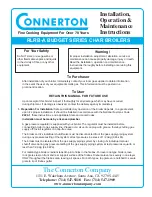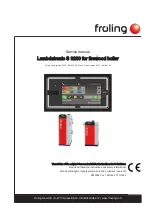
15
3. Factory settings
3.1 Mixer - servo motor - control
Factory settings of mixer / servo motor:
Mixer open = no admixing on the flo
w side, position of toggle pin and groove according to dra-
wing, the manually operated handle, which is found on the motor, stands at 45° upwards.
see Fig. 6 and 6.1
Fig. 6 Position „open”
A
Boiler
B
Closing segment of the mixer insert
C
Bypass pass (adjustable)
D
Low temperature heating circuit
E
Flat portion at the shaft end parallel to the passage
Fig. 6 Position „closed”
A
Boiler
B
Closing segment of the mixer insert
C
Bypass pass (adjustable)
D
Low temperature heating circuit
E
Flat portion at the shaft end parallel to the cross connection
Servo motor - technical data
Nominal voltage
AC 230V 50/60 Hz
Power consumption
2.5 W
Connection
Cable 3 x 0.5 mm², length 2 m
Rotational direction
selectable via wiring
Manual operation
temporary and permanent gear
latching with turning knob at
the housing
Torque
6 Nm (at nominal voltage)
Rotation angle
electrically limited to 90°
Runtime
140 s
Acoustic power level
max. 35 dB (A)
Position indicator
reversible scale plate 0 ... 1
Assembly position
user
-defined except for hanging drive
Protection class
II (protection insulated, without
Protection type
IP 40
Ambient temperature
0°C ... +50°C
Storage temperature
-30°C ... +80°C
EMV
CE
Runtime
CE
Maintenance
maintenance-free
Weight
0.4 kg
3-level triggering
Application
The drive is used in connection with an assembly
kit as drive for the motorisation of the Meibes
mixers in the HKL system.
Mode of action
Triggering is effected by standard control systems
with 3-level output.
Product characteristics
Simple direct assembly with supplied adapter
kits suitable for all Meibes mixers. Position is
selectable in 90° steps.
Rotation angle is electrically limited to 90°.
With attainment of the end stops, the drive is
switched-off and therewith without current.
Manual operation
By means of a screwdriver, rotate the turning knob
into the „Manual operation” position (see detail 1).
see Fig. 6.2, 6.3 and 6.4
Fig. 6.2
A
Manual operation
Fig. 6.3
A
Automatic operated
Fig. 6.4
A
3 point regulator (Connection diagram)
















































